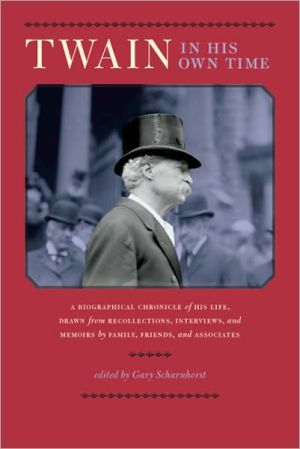

 |

|

The average rating for Twain in His Own Time: A Biographical Chronicle of His Life, Drawn from Recollections, Interviews, and Memoirs by Family, Friends, and Associates based on 2 reviews is 3 stars.
Review # 1 was written on 2011-09-26 00:00:00 Rick Robinson Rick RobinsonA Good Overview Of "Howl" and Allen Ginsberg In a moment that has become iconic in American avant-garde literature, Allen Ginsberg read the first part of his long poem "Howl" at the Six Gallery in San Francisco on October 7, 1955. Several other local readings followed. Laurence Ferlinghetti and City Lights Press published the poem in 1956, and it has sold more than 800,000 copies. An obscenity trial in San Francisco in 1957 only added to the poem's notoriety. "Howl" presents a dark, bleak vision of America in the 1950s, but it also includes passion, religious hope, and a sardonic humor. It reflects part of the American fascination with the figure of the outsider in the Twentieth Century. Ginsberg's poem and his friend Jack Kerouac's novel "On the Road" published in 1957 soon became the most famous texts of a small group of writers known as the Beats. Jonah Raskin's study, "American Scream" (2004) tells the story of "Howl" and how Ginsberg (1926 -- 1997) came to write it. Raskin, Professor of Communication Studies at Sonoma State University, offers an informative, sympathetic study of Ginsberg which traces the many literary and personal influences that coalesced in his great poem. A combination of biography, history, and literary analysis, Raskin's book offers a good introduction to the poem. Raskin describes Ginsberg's early life and shows how the poet's conflicted relationship with both parents influenced "Howl". Ginsberg's mother, Naomi, was a member of the communist party. She was seriously paranoid and spent much of her life in institutions. Her life and "madness" formed a pervasive theme for "Howl". Ginsberg's father, Louis, was himself a poet who, from Raskin's account, deserves to be better remembered. Although he wrote mostly conventional verses, some of Louis' writings have the apocalyptic character that his rebellious son captured in "Howl". Raskin's book insightfully describes the father-son relationship. I would have liked to hear more about it. Raskin also discusses Ginsberg's friends in the "hip" Columbia University and New York City community of the 1940s. Raskin carefully traces some of the literary influences on Ginsberg. Walt Whitman, of course, was a great influence on "Howl" as was Ginsberg's mentor, the American poet William Carlos Williams. But some of Ginsberg's influences may be less obvious. In his years at Columbia, Ginsberg was a careful student of literary surrealism and of modernism in the poetry of T.S. Elliott. Elliott's "The Waste Land" was a major influence on "Howl", and Raskin develops the many parallels in these two important 20th Century poems. Raskin also quotes from many earlier Ginsberg poems to show how modernistic themes, as well as issues with the poet's own sexuality, drug use, suicidal thoughts, institutionalization, and spirituality found expression in "Howl". Although afflicted with his own demons, Ginsberg was also a shrewd self-promoter. Raskin describes how Ginsberg worked, for the remainder of his long life, to reinvent "Howl" and to use his own eccentric behavior to market the poem. Much of Raskin's book examines the American culture of conformity that developed in the 1950's. Ginsberg's poem was a protest against this culture as well as an expression of his own inner life. The more vivid sections of the book are about Ginsberg himself and about the way in which "Howl" became a poem both autobiographical and imagined. The literary analysis of the work is offered in sections together with the treatment of Ginsberg's life and 1950's American culture. Raskin offers many valuable comments about "Howl", its composition, and its formal structure. Because of the mixed character of the study, the book does not offer a close reading of Ginsberg's text. At the end of the book, Raskin captures well something of the spirit of "Howl". He quotes Kerouac's description of the poem as "beautiful in an ugly graceful way." Raskin himself concludes eloquently: "With passion and precision -- and from a sense of anomie and terror -- Allen Ginsberg told the truth, as best he could, about himself, the world, and the cosmos. In "Howl", he owed no allegiance to any cause, party, or movement in poetry. By following his own muse he found his own voice and by expressing his own madness he disclosed much of the madness of America." (p. 230) Raskin has written a scholarly work. Valuable as it is, the book does not reflect fully the iconoclastic, passionate, and violent world of the Beats. Even so, the book served its purpose in that it led me to reread "Howl" with greater understanding together with several of Ginsberg's related poems that Raskin discusses.This book is an accessible guide to "Howl". Robin Friedman |
Review # 2 was written on 2012-06-17 00:00:00 Chen Tim Chen TimA very peculiar book. Its treatment of Ginsberg is panegyric, to the point that it even impedes the reading. We get constant references to literature that 'electrified [his] body' - we get it, Ginsberg was fond of Whitman. But is it really crucial to keep reminding readers that Ginsberg was a genius? This makes the prose heavy-handed, and even I can assume that the author was at least partially inspired by Ginsberg's dislike of the methodology offered by New Criticism, it nonetheless does not read well. That said, the book is well researched, and relies on scores of material that has never before been used, and is very informative, and is worth a read, though there are parts that can be only skimmed over. |
CAN'T FIND WHAT YOU'RE LOOKING FOR? CLICK HERE!!!